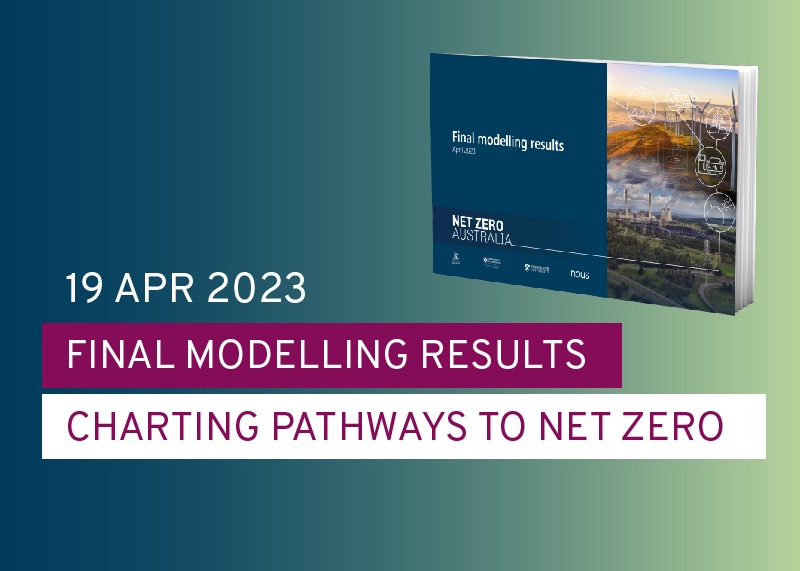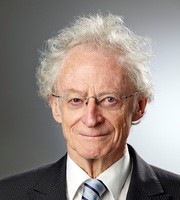Net Zero Australia: Final results from a groundbreaking study

ABOUT
What might net zero look like for Australia? What changes might we have to make to our economy, infrastructure, and outlook to achieve net zero emissions by mid-century?
The Melbourne Energy Institute co-hosted the public release of final results from Net Zero Australia, a groundbreaking multi-year study into how Australia might achieve a net zero economy, conducted in partnership by the University of Melbourne, The University of Queensland, Princeton University and international management consultancy Nous Group.
Launched in 2020, the Net Zero Australia study aims to provide rigorous and independent analysis of how Australia can achieve net zero emissions for both our domestic and export economies. Interim modelling results released in August 2022 showed that achieving net zero will be an immense challenge, but it also creates a once-in-a-generation nation-building opportunity.
The final findings from the study were made public for the first time at this event, including a detailed breakdown of possible scenarios and sensitivities, sector by sector, and comprehensive mapping of the transition to net zero emissions. Read more about the final results.
Hosted by The University of Queensland, the final results launch was held in-person in Brisbane and streamed online. Read more about the event on the Net Zero Australia project website.
NET ZERO AUSTRALIA
Net Zero Australia is a collaborative research partnership between the University of Melbourne, The University of Queensland, Princeton University and management consultancy Nous Group. Its groundbreaking Net Zero Australia study applies Princeton University’s Rapid Switch framework to the Australian context, identifying detailed pathways and infrastructure requirements by which Australia can transition to net zero emissions and become a major exporter of low emission energy and products by 2050.
The study is overseen by a Steering Committee chaired by former Chief Scientist of Australia, Emeritus Professor Robin Batterham. An Advisory Group includes nominees from the Australian Conservation Foundation, the Australian Council of Trade Unions, the Climate Council, Energy Consumers Australia, the Ethics Centre, the National Farmers Federation, the National Native Title Council, St Vincent de Paul, three independent members, and nominees from each of the sponsoring organisations.
Gold Level sponsors are Worley, Dow, Future Energy Exports Cooperative Research Centre (FEnEx CRC), APA Group and the Minderoo Foundation. The Silver Level sponsor is Future Fuels Cooperative Research Centre (FFCRC).
PANELLISTS

Professor Robin Batterham
Independent Member and Chair, Net Zero Australia
Robin Batterham joined the Melbourne School of Engineering as Kernot Professor in the Department of Chemical and Biomolecular Engineering in 2010. He is past President of the Academy of Technology and Engineering (2007-2012), former Chief Scientist of Australia (1999-2005), and for over 20 years Global Head of Innovation (and other positions) at Rio Tinto.

Katherin Domansky
Independent Member, Net Zero Australia
Katherin Domansky is a highly experienced and motivated leader in strategy, commercial and business development, with a strong reputation for delivery across the commercial value chain for major integrated energy projects. She has extensive experience across the energy value chain, with proven leadership of multi-disciplinary teams and a collaborative mindset. Katherin has international expertise, having lived overseas as well as working on international transactions in global companies.

Professor Michael Brear
Project Director - University of Melbourne
Michael Brear is a mechanical engineer and the Director of the Melbourne Energy Institute (MEI) at the University of Melbourne. MEI facilitates the University’s research on the technical, economic, environmental and social impacts of energy. Michael is a Fellow of the Australian Academy of Technology and Engineering, the Combustion Institute, Engineers Australia and the Australian Institute of Energy.

Associate Professor Simon Smart
Project Director – The University of Queensland
Simon Smart is Deputy Director of the Dow Centre for Sustainable Engineering Innovation and an Associate Professor in the School of Chemical Engineering at The University of Queensland. His research is centred around the sustainable production and use of energy and chemicals – including the development of enabling technologies and processes for the production of clean energy, materials and water.

Richard Bolt
Project Director – Nous Group
Richard Bolt is a Principal at Nous Group. Richard has had a diverse career in public advocacy and government. He has led organisations ranging from a community-based advocacy group to one of the largest government departments established in Australia. His achievements include lead roles in national carbon and energy policy reform; driving technology innovation in energy, resources and agriculture. Richard was a member of the Stakeholder Advisory Group to Chief Scientist Alan Finkel for the development of a national hydrogen strategy. He was also a member of the Advisory Panel to the Energy Security Board on the post-2025 design of the national electricity market.